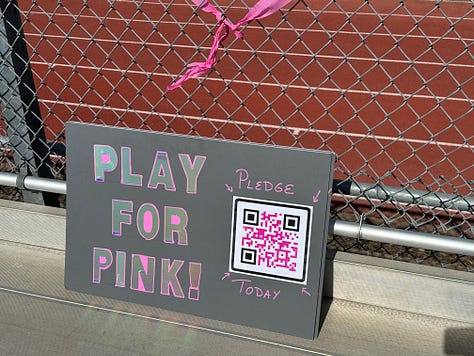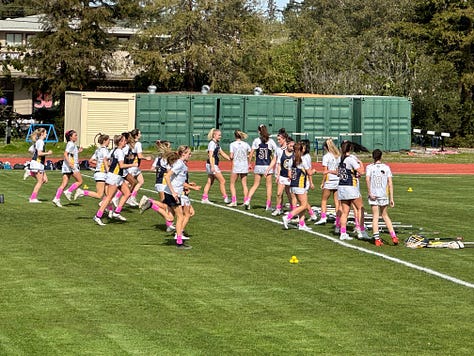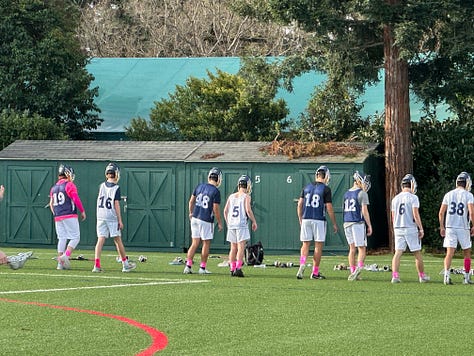15 Again
Eerie cosmic coincidence
My mother's chemotherapy began when I was 15 and a half. Ironically, I was diagnosed with breast cancer when my daughter was 15 and a half.
My mother's treatment was the defining experience of my high school years. It felt like I was the only person whose mother was having chemotherapy because people didn't talk about cancer back in 1985. My father was shaken to his core by this loco-regional recurrence and lacked extensive coping skills and supporters for his trauma. Perhaps many people would have supported my father, mother, sister, and me, but my parents didn't feel they could ask.
Chemotherapy is a long, drawn-out series of pitches to see and hit. Other than refusing treatment, I didn't have a choice about stepping up to the plate. The infusion is often calm or boring - except that my mother and father drove an hour each way from Holmdel, NJ to Manhattan for them every three weeks. Not only did the drive remind both of them that Mom was fighting cancer again, but my Dad fundamentally disliked Manhattan because, in the 1980s, it was dirty, congested, and unsafe. Not to mention the traffic on the drive both ways.

There was nothing about these infusions that was good. Mom was exhausted and queasy when they came home, so she would disappear into their room for the next 36 hours. They usually arrived home before I did. Dad didn't take the day off, so he was stressed by the in-your-face cancer day AND anxious to catch up on the day's work in 4-5 hours. When I arrived home after a full day of school and sports, I needed to prepare dinner, cook, and serve.

During those dinners with the three of us, Dad didn't really want to hear chatter about our days. And often, he vocalized his fears that this is what our lives would be like if Mom died. The saving grace of Friday dinners was that they were fast, and then Dad would unwind watching TV while Tracey and I would clean up. Because we lived in suburbia, there was no way to go out without getting a ride, and Friday nights were not times my Dad was up for more chauffeuring. So after dinner, it was TV or talking with someone.
The chemotherapy pitch series can last 4-6-8 months depending on the regimen, whether your immune system and red blood cells can withstand treatment at the prescribed frequency, and whether it's practical. I don't remember my mother ever needing to delay or skip a treatment. In between infusions, chemotherapy delivers its power punch of side effects. Mom was typically very energetic and an incredible athlete - during her chemo treatment, she was quick to fatigue. She lost her hair, although I don't remember ever seeing her bald. She had wigs, turbans, and scarves to present herself as generally as possible. To bolster her immune system, she had to take steroids, and the steroids made her oval face round and puffy. She didn't look or feel like herself.
She wanted to keep things regular for my sister and me, so she was still driving us to after-school activities (luckily, mine were almost all at the high school, and there was a late bus I could take to get home) and social engagements. My Dad resented that she was driving us because she was fatigued, which probably interfered with her rest. Dad continued to work hard, keep our health insurance, and keep his company thriving (it was a pivotal positive year for his business with many decisions to make and pressures on him). He also had the lingering fear that the cancer would return again and that he would lose the love of his life.
Supporting my father and preparing dinners felt very adult and distinctive from the usual tumult of being a teenage girl. I never fit in all that well in high school (or before), and the cancer narrative made me feel even less connected to kids I barely connected within the first place. Which wasn't their fault - I wasn't socially adept, and other than my boyfriend, I don't think many people knew about my mom.
My mom survived. So did I. College was much more typical. In retrospect, there were definitely other people in my high school dealing with a parent with cancer. We really could have supported each other or at least engaged in gallows humor. Except no one talked about cancer in 1985.
There was no way I wanted my 15-and-a-half-year-old daughter to have anything like my experience with my mother's cancer. After ensuring that I was going to have excellent healthcare and live, my highest priority was to insulate my daughter from the obligations of being my caregiver and to keep her life as normal as possible. My husband was wholly aligned with me.
I mostly succeeded because…
…I encouraged my kids to tell people because support comes from surprising places. My daughter found peers the day after my diagnosis who had lived through the loss of a parent and a parent with cancer. These kids knew what to do and say. So did her teachers, counselors, coaches, and school administrators. In fact, I am awed at the speed at which the Menlo School ensured that the right people knew that my daughter didn't have to repeat the story relentlessly and she had skilled support.
…I have an incredible community who were happy to provide meals so that no one in my house had to think about cooking. People cooked, provided takeout, asked to visit (and left when I asked).
…my husband was hellbent not to need my support. He leaned on his friends. He supported our kids and me. He had the tools to deal with his fears. He was very grateful that my cancer was caught early and confident that the treatment would be 100% curative.
…my mother is still alive, and my sister is still alive, so my family has living evidence that breast cancer can be treated, and obliterated, and life is fantastic afterward. My parents didn't have that perspective.
…my side effects were incredibly mild. I had energy. I kept my hair. I wasn't queasy or uncomfortable (very much). So, I attended soccer and lacrosse games. I was at my daughter's performance. And I could cheer as loudly and wildly as I usually do. I believe my mother attended all my sister's and my athletic events when she was being treated, too.
My daughter blew my mind when she decided she needed to "do something," so she was going to organize an awareness fundraiser for the Girls (and then Boys joined) Lacrosse teams two months after I started chemo. JV and Varsity Lacrosse teams AND their competitors supported her Play LAX for Pink. The community raised $5000 for breast cancer support (Sharsheret was the recipient). And she's making it an annual spring event for her school.



My heart breaks that I couldn't insulate her entirely because she's a compassionate, emotionally connected, thoughtful, intelligent young woman. She leveraged support, but she doesn't remember much of the second half of her Sophomore year of high school because I was being treated for cancer. The enormity of that reality was an eclipse that darkened the rest of the spring for her and weighed heavy on my mind. I do believe that she developed curveball hitting skills by living through this experience.
She wonders what my diagnosis and our shared genetic material mean for her future. She ruminates, and medical ethics prohibit testing for the BRCA 1 gene until she is 18, so she cannot know how significant breast cancer could be to her future. Additionally, even if she learns she has the mutation, she's too young for any screening or prophylactic treatment. It's a very uncomfortable spot to be reminded of every day when you come home and hug your mom. I remember feeling very guilty, feeling my own fears for myself while my mother was being treated, and I have no doubt that my daughter struggled with the same emotions.
My daughter didn't have to be a caretaker, cook, or counselor during my cancer treatment. She got her driver's license during my chemotherapy treatment with me at the DMV to cheer her on. We made many good memories during my cancer year - we went to Disneyland, NYC, and Broadway. We saw Taylor Swift, Billy Joel, and Pink in concert. We went to Ann Arbor to visit my alma mater and cheered for the Wolverines in the Big House. We've played multiple music shows together. I hope that her memories of my cancer years are primarily positive, and I pray that she never has to tell her 15-and-a-half-year-old daughter that she has breast cancer. Perhaps in the next 20 years, there will be scientific breakthroughs in preventative treatment that stop this cycle at 15 again.



